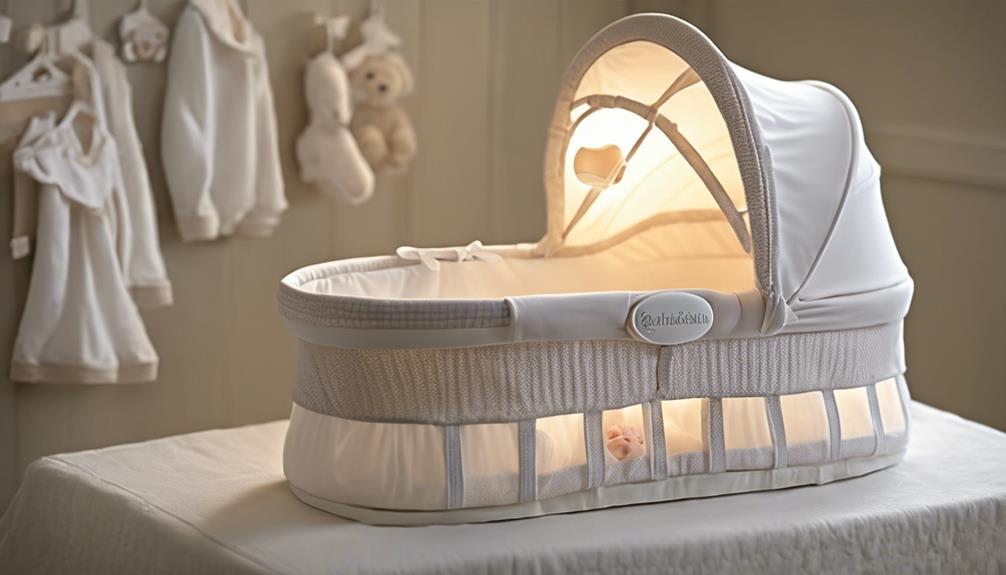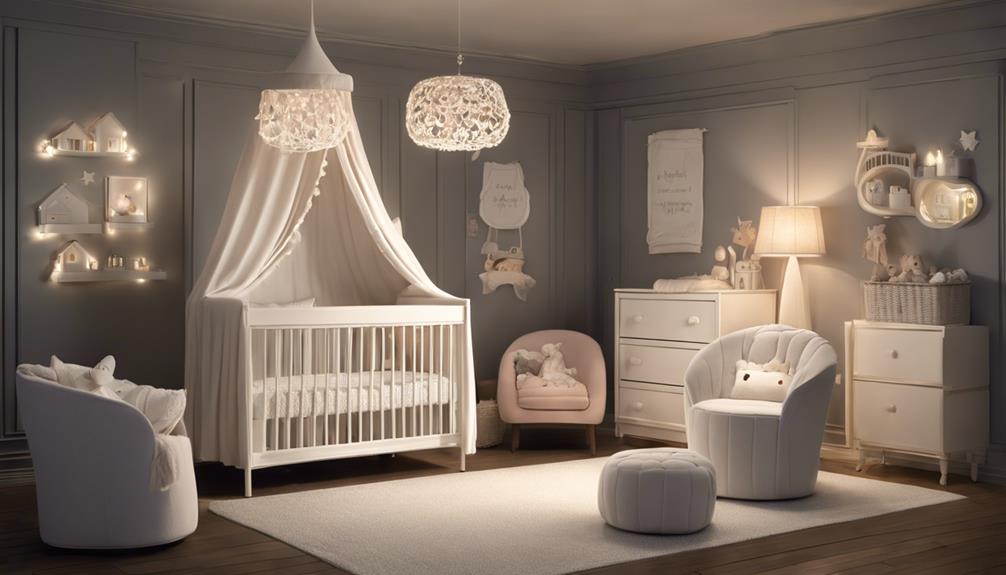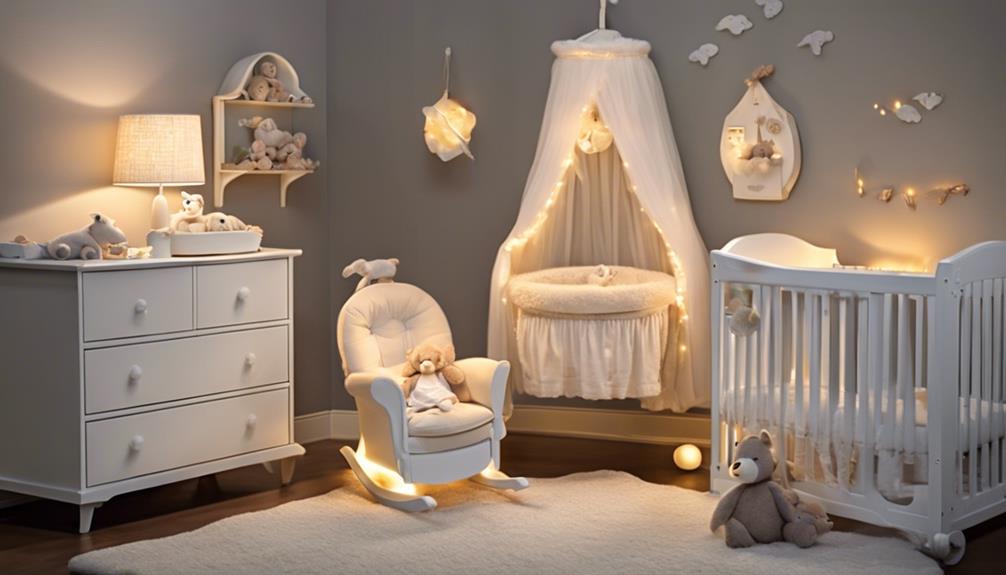When it comes to helping your newborn settle into peaceful sleep in a bassinet, we understand the importance of setting the right stage for rest.
But have you considered all the factors that contribute to a comfortable slumber for your little one?
Let's explore some key strategies that can make a significant difference in your baby's sleep quality and duration, ensuring both you and your newborn can enjoy a more restful night.
Key Takeaways
- Use a firm mattress and avoid soft bedding for safe and cozy sleep
- Establish a consistent bedtime routine in a quiet, dark room
- Swaddle your newborn for security and consider white noise for soothing sleep
- Transition to a crib from the bassinet for enhanced safety and comfort

Baby Bassinet Mattress 33 x 20 inches- Firm Support and Comfort Premium Foam,Noiseless and Odorless,Hypoallergenic Small Crib Mattress, Fits Moses Basket, Dual Sided with Soft Breathable Fabric
Smell: The vast majority of bassinet mattress have a pungent smell that makes them uncomfortable. To be honest,…
As an affiliate, we earn on qualifying purchases.
As an affiliate, we earn on qualifying purchases.
Importance of Bassinet Sleep
Understanding why bassinet sleep is essential for your newborn's safety and well-being can help you provide the best possible sleep environment.
Bassinet sleep is recommended by experts for newborns up to 4 months to reduce the risk of Sudden Infant Death Syndrome (SIDS). By using a bassinet with a firm mattress and breathable sides, you create a safe sleep space that promotes healthy sleep habits from the start.
Prioritizing safe sleep guidelines, such as placing your baby on their back to sleep, is critical for a comfortable and secure bassinet sleep experience. This practice not only guarantees safety but also aids in the development of independent sleep routines.
As your baby grows, shifting gradually from a bassinet to a crib can enhance both safety and comfort. Embracing bassinet sleep early on sets the foundation for a lifetime of healthy sleep patterns and fosters a sense of security for your little one.

Yoofoss Bassinet Sheets for Baby,3-Pack Fitted Bassinet Sheets Set Compatible with Halo Bassinest Swivel Sleeper,Baby Delight,Angelbliss,Soft Breathable Bassinet Mattress Sheets(Green+Leaf)
Perfect Fit: The Yoofoss bassinet sheets measures 32×16 inches with a 5-inch deep pocket , designed to fit…
As an affiliate, we earn on qualifying purchases.
As an affiliate, we earn on qualifying purchases.
Understanding Newborn Sleep Patterns

With newborns typically sleeping for 14-17 hours a day in short stretches of 2-4 hours at a time, it's important to grasp their unique sleep patterns to provide the best care. Newborn sleep patterns are characterized by irregular sleep cycles, with a significant amount of time spent in REM sleep. While they may have difficulty entering deep sleep stages, resulting in frequent night wakings, it's vital to understand their sleep changes, which occur every 50-60 minutes.
By recognizing these patterns, parents can anticipate their baby's sleep needs more effectively. Creating a suitable sleep environment in the bassinet, such as a quiet and dark room, can help promote better sleep. Paying attention to sleep cues like eye rubbing or yawning can also aid in recognizing when your newborn is ready for rest.

Magicteam White Noise Machine with 20 Non Looping Natural Soothing Sounds Memory Function 32 Levels of Volume Powered by AC or USB and Sleep Sound Timer Therapy for Baby Kids Adults Black
❤20 Non-Looping Sleep Sounds: White noise ,Brown noise, pink noise, blue noise, fan,brook, rain, ocean,bird and Bonfire,suitable for…
As an affiliate, we earn on qualifying purchases.
As an affiliate, we earn on qualifying purchases.
Creating a Cozy Sleep Environment

To create a cozy sleep environment for your newborn in the bassinet, prioritize safety by ensuring the mattress is firm and flat. A firm mattress provides a safe sleep space and reduces the risk of SIDS, so make sure it fits snugly in the bassinet.
Opt for fitted sheets designed specifically for the bassinet to prevent suffocation hazards and maintain a clutter-free sleeping area. Avoid placing soft bedding, pillows, or plush toys in the bassinet to further decrease the risk of SIDS.
Position the bassinet away from drafty areas and direct sunlight to help regulate a comfortable temperature for your little one. By keeping the sleep space cozy, safe, and free from potential hazards, you can create an ideal environment for your newborn to rest peacefully.
Prioritizing these steps won't only enhance your baby's comfort but also promote a secure and restful sleep routine.

Muslin Swaddle Blankets for Newborn, 3 Pack Breathable Soft Receiving Blanket, Large 38 x 40 inches Swaddle Wrap Burping Clothes, Essentials Infant Shower Items, Toddler Gift (Bright Colors)
SUPER SOFT TO BABY’S SKIN: It is made of safe, natural and pure muslin 100% organic cotton cloth…
As an affiliate, we earn on qualifying purchases.
As an affiliate, we earn on qualifying purchases.
Establishing Bedtime Routines

Establish a consistent bedtime routine with calming activities like a warm bath or gentle massage to signal sleep time effectively. These routines help your newborn understand that it's time to wind down and prepare for a restful night in the bassinet.
Utilizing soft music or white noise can create a soothing ambiance that promotes sleep. Dimming the lights during this routine aids in establishing a distinction between day and night, assisting in the development of healthy sleep patterns.
Including a feeding session or quiet nursing time before placing your baby in the bassinet can enhance their comfort and sense of fullness, promoting better sleep. Placing the bassinet in a quiet, dark room free from distractions further encourages a peaceful and comfortable sleep environment.
Tips for Helping Baby Sleep Comfortably

To guarantee your newborn sleeps comfortably in the bassinet, consider swaddling them to provide a sense of security and mimic the cozy environment of the womb. Swaddling can help your baby feel snug and calm, promoting better sleep in the bassinet.
Additionally, incorporating a white noise machine can create a soothing background sound that mimics the familiar noises from the womb, helping your newborn relax and drift off to sleep peacefully. Make sure the bassinet mattress is firm and free of any loose bedding to maintain a safe sleep environment for your little one.
Placing the bassinet in a quiet room with minimal distractions and dim lighting can further aid in creating a conducive environment for your baby to sleep comfortably.
Conclusion
To summarize, creating a cozy sleep environment and establishing bedtime routines are essential for helping your newborn sleep comfortably in a bassinet.
By regulating the room temperature, using calming activities, and encouraging independent sleep habits, you can help your baby feel secure and relaxed.
Remember, consistency is key in promoting peaceful sleep for your little one. Sweet dreams to your newborn in their cozy bassinet!









